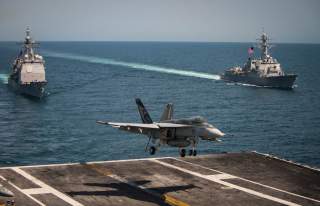Is Donald Trump Giving Up on the South China Sea?
How will China take it?

The Trump administration is reportedly giving China a pass on its questionable activities in the South China Sea.
U.S. Pacific Command requested permission a few weeks ago to conduct a freedom-of-navigation operation within 12 nautical miles of the disputed Scarborough Shoal, territory claimed by both Manila and Beijing. The Pentagon turned down the request, just as it did to earlier Navy requests in February, reports the New York Times.
The requests were denied before they ever reached the White House.
Throughout much of the Obama administration, the president was hesitant to conduct freedom-of-navigation operations for fear of angering China. Despite clear signs of Chinese expansionism and militarization in the South China Sea for years prior, former President Barack Obama did not authorize any freedom-of-navigation operations in the South China Sea until Sept. 2015.
The U.S. has sent ships to challenge Chinese claims in the South China Sea four times, yet during the first 100 days of the Trump administration, the U.S. has yet to pressure China at sea.
Secretary of Defense James Mattis reportedly expressed a strong desire for regular freedom-of-navigation operations during his trip to Japan in February, in order to counter Chinese expansionism through the development of artificial islands and the construction of military outposts.
The Navy Times reported in mid-February that the Navy and PACOM wanted to increase the frequency of freedom-of-navigation operations in the South China Sea.
“All of the language, combined with the fact that the Republican foreign policy establishment had been critical of Obama for not carrying out enough [freedom-of-navigation operations], means there was a wide expectation that Trump would put down a marker early. And that has not happened,” Robert Daly, director of the Kissinger Institute on China and the US at the Wilson Center, told The New York Times.
U.S. officials told CNN that the decision to hold off on freedom-of-navigation operations stems from the Trump administration’s desire to see China rein in North Korea. President Donald Trump has backed away from his earlier claims to punish China for its unfair trading practices to persuade the country to cooperate.
Trump accused China in March of last year of building “a military fortress” in the South China Sea, “the likes of which perhaps the world has not seen.” He added, “They do that at will because they have no respect for our president, and they have no respect for our country.” That rhetoric has faded though.
The Trump administration argues that “North Korea represents the most serious security threat in the world,” suggesting that past issues, such as the South China Sea, can be shifted to the back burner.
The Pentagon told CNN that the U.S. will continue to conduct freedom-of-navigation operations, but the “operations will be released publicly in the annual FONOPs report, and not sooner.”
Since December, analysts have detected extensive militarization in the Paracel Islands and the Spratly Islands, strengthening China’s military presence in contested waters.
Content created by The Daily Caller News Foundation is available without charge to any eligible news publisher that can provide a large audience. For licensing opportunities of our original content, please contact [email protected].

